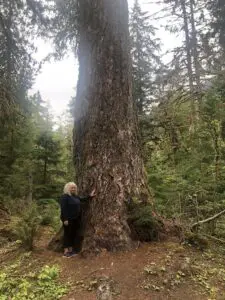As of this writing, we are finally forecast to get a badly needed, measurable rainfall. I will take advantage of the softened soil to complete some garden tasks that were either more challenging or not feasible until now.
Managing pervasive species
As the trees dropped their leaves, a few woody plants caught my attention in the woods. While I’ve noticed burning bush seedlings in past years announcing their presence with red leaves, this year the amur honeysuckle’s yellow leaves grabbed my attention.
Once I had identified it, I saw it everywhere. Both burning bush and amur honeysuckle are introduced species that have the tendency to aggressively spread out and lose their leaves later than native species. It’s been too dry to pull anything, but now that we’re getting rain, I can take a walk and clear them.
Planting — yes, you can
Garlic, bulbs and deciduous trees can still be planted. I managed to get seed garlic from Fedco shipped last week after losing hope that I had waited too long. After the rain, the soil will be loose enough to slip bulbs into the garden and alliums into the flowerbeds. I even picked up tulip bulbs to be planted in containers on the patio. Will the tulips be a deer snack rather than a lovely bouquet? Odds are on the deer, but I’ll try anyway.
Since we’ve had such a warm fall, the ground hasn’t frozen, and it’s still possible to plant trees. The timing is great since the trees are dormant. Watering will be necessary until the ground freezes, but they will need less with the cooler temperatures and a layer of mulch.

During the last significant drought, we experienced air in the pipes of our well because the water was low. Fortunately, we were able to avoid having to take drastic actions, but when we go through periods without rain, my family doesn’t wait for official notice to be cautious.
I keep a watering can near the kitchen sink and dump any leftover water from our drinking glasses, cleaning vegetables and cooking. After our rain barrel went dry, that gave me just enough water for plants that I needed to maintain. Another conservation trick is to catch the water from the shower or faucet while you wait for it to warm up.
Clean and sharpen tools
This is one task I should do more often. Although I clean tools during the season to make sure I’m not moving jumping worms or unwanted plant seeds around between client projects, I need to sharpen all the pruners. Sharp blades are more efficient and easier on your body.
Edging
Softened ground makes for a less taxing job when you install edging. Whether it’s metal that can be pounded in with a mallet, a rock border or material that needs to be dug in, now is a good moment to get that project completed. I have a few areas that need a boundary from creeping lawn and they will finally get it.
Leave the leaves
I’ve covered this topic before and this season I have an additional timely reason for not having a clean-swept lawn. Leaf cover helps protect the soil and plants during a drought because, when there is precipitation, they absorb rainwater and prevent runoff and soil erosion. As the leaves decompose on the lawn during the winter and spring, they add organic matter to the soil, making it more absorbent.
Rest
Gardeners can be a relentlessly productive and ambitious bunch. I could stand in my doorway right now and point out 37 things that need to be done within a 10-foot radius. And yet, we’ve been through a lot this year and the coming years will have setbacks and upheaval for people who care about the non-human world and a healthy, livable environment.
Take some time to appreciate the trees and plants that make it possible for us to survive on this planet. Celebrate what you’ve created and nurtured. We need a period of dormancy, too, to gather our energy for the coming season.

